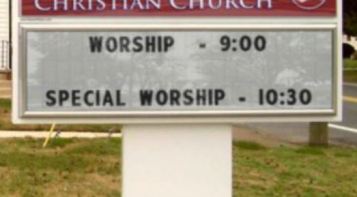
When it comes to people with developmental disabilities, integration into typical environments is always the best option. Or is it?
One look at where people with developmental disabilities have lived over the past few decades demonstrates a decided shift away from institutions and, more recently, even group homes. A similar move has happened in public school classrooms. The number of self-contained special education schools and classrooms is a fraction of what it once was. The future (and the present, for that matter) belongs to more independent and integrated environments.
Still, some specialized and dedicated activities remain and most people would agree that they are, in no way, viewed as problems to be solved. Special Olympics is wildly popular and continues to offer important experiences that may be unavailable elsewhere. These programs offer people an opportunity to experience success, camaraderie, joy and interaction.
As people of faith, this issue should grab our attention because the same philosophical discussion is going on in our ministries.
Where is worship for people with developmental disabilities most meaningful and inclusive? Does it happen best when people participate as an integrated part of a congregation that earnestly announces its welcome and acceptance of all people, regardless of ability? Or, is it more likely to happen in an environment specifically designed to accommodate different styles of expression or learning? As the reach of both types expands, the question – integrated, congregation-based ministry, or a dedicated, disability-friendly ministry – becomes more and more important to consider.
Understandably, people with disabilities and their families have learned to be wary of programs that seem to separate them from their non-disabled peers. They may have become equally wary of the “You are welcome!” invitation with the implied understanding, “Please sit quietly in the back.” Sometimes, worship that appears integrated really isn’t. The hymnals are opened, but I cannot read. The congregation is told to rise, but I am able to do so only in spirit. An atmosphere of quiet is expected, but I am unable to control the sounds I make. The sermons invite sustained attention and depth of thought, neither of which is counted among my gifts. I am present here, but am I truly included?
Then, there are the alternative, specialized or dedicated ministries designed specifically for the needs of people with intellectual and developmental disabilities. In the Christian tradition, there are several examples of organizations designed for this purpose, and their success is impressive. The list includes groups such as Friendship Ministries, Jesus Cares Ministries, Rejoicing Spirits and a host of independent ministries. In every case, soft or loud, active or passive, the word is proclaimed, prayers find voice, and praise is freely expressed. These are not environments merely of welcome and accommodation. Differences are celebrated here and participants, the only ones truly qualified to judge, call them what they are: Inclusive.
The paradox, that the most inclusive environment for an individual may be one that happens apart from the congregation, is an important dialogue into which we are all called. And we ought not be satisfied with easy answers.






